Unit 1 What's the matter? SectionA3a-3c课件20张
文档属性
| 名称 | Unit 1 What's the matter? SectionA3a-3c课件20张 | 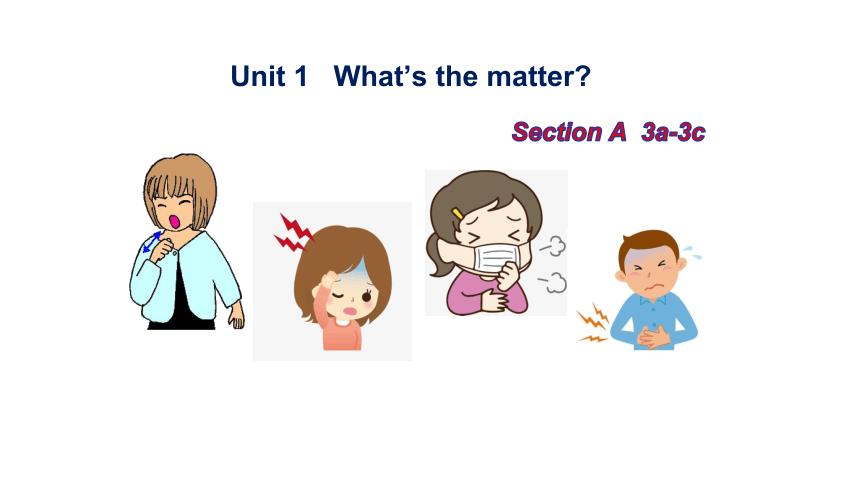 | |
| 格式 | pptx | ||
| 文件大小 | 982.7KB | ||
| 资源类型 | 教案 | ||
| 版本资源 | 人教新目标(Go for it)版 | ||
| 科目 | 英语 | ||
| 更新时间 | 2022-02-24 19:00:48 | ||
图片预览

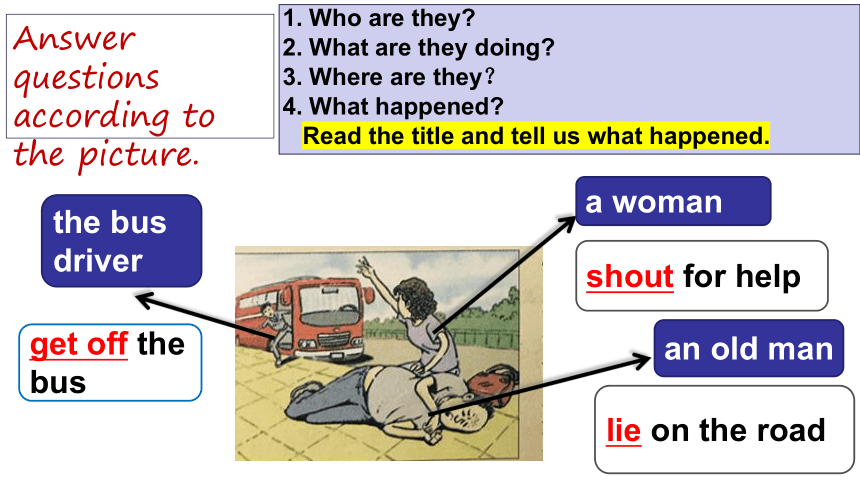
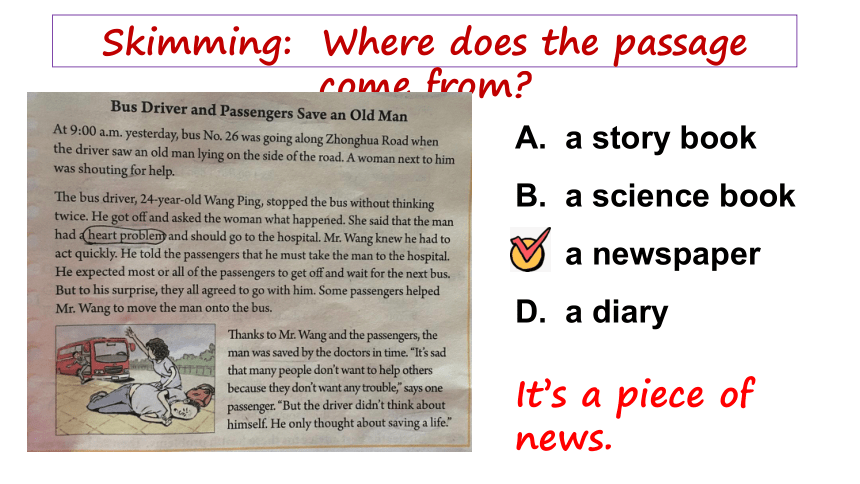
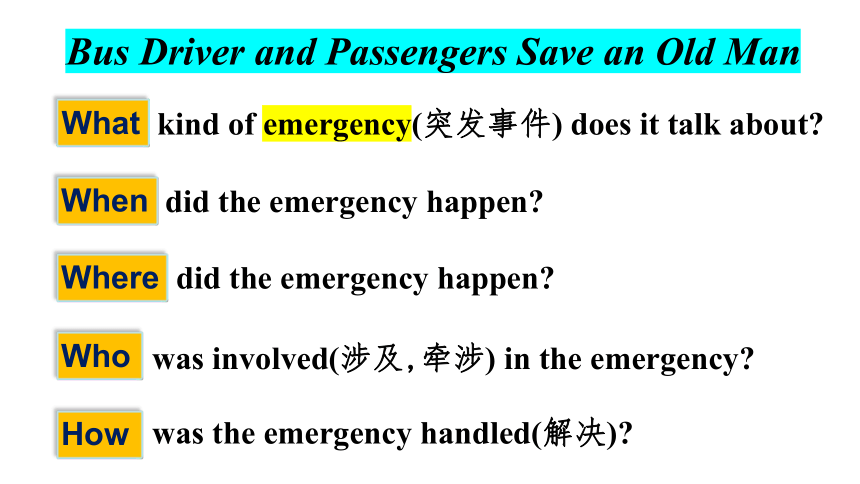
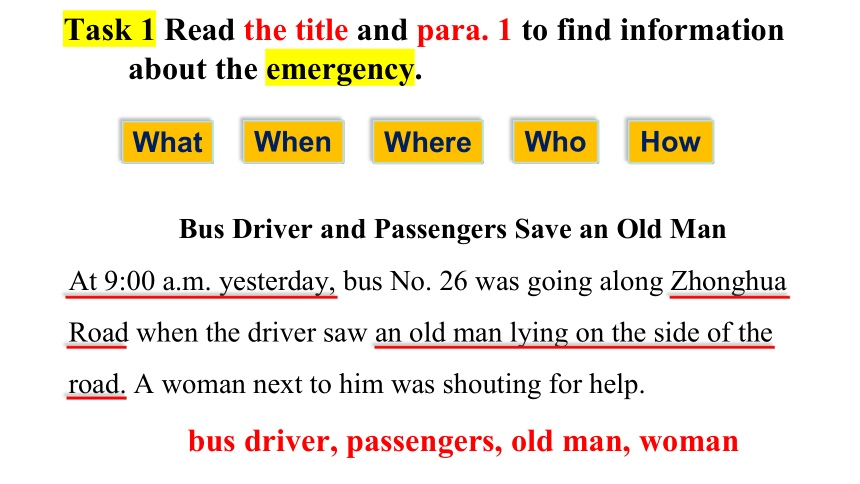
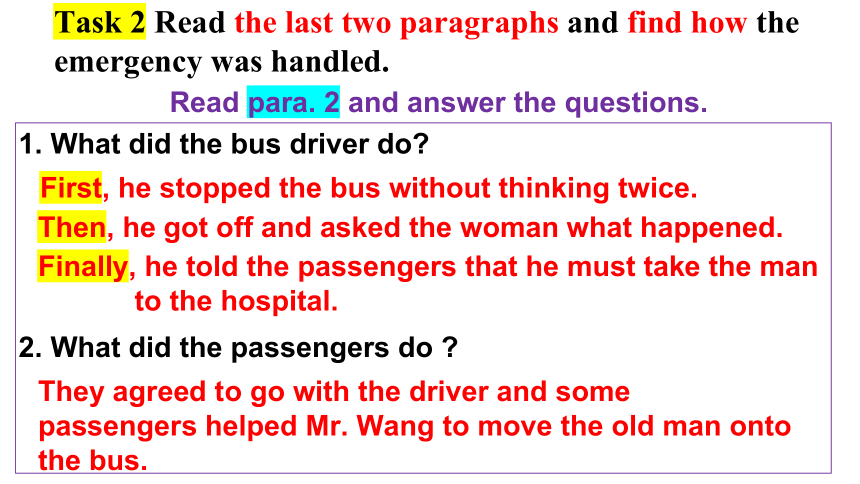
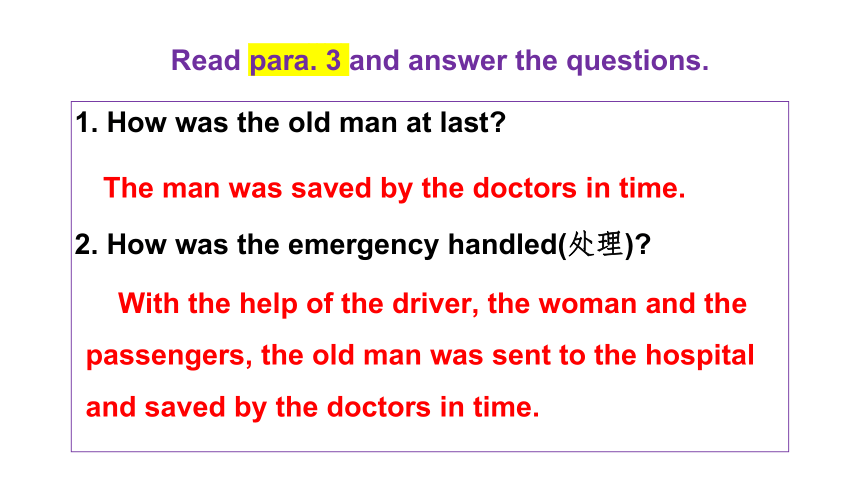
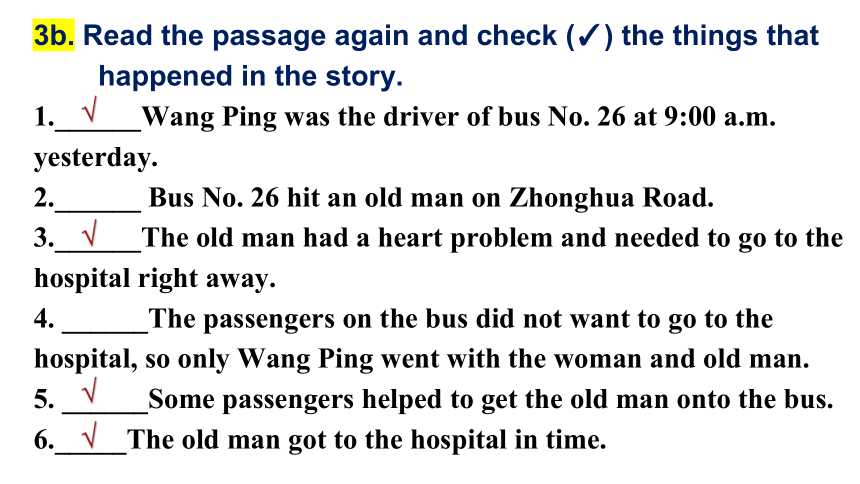
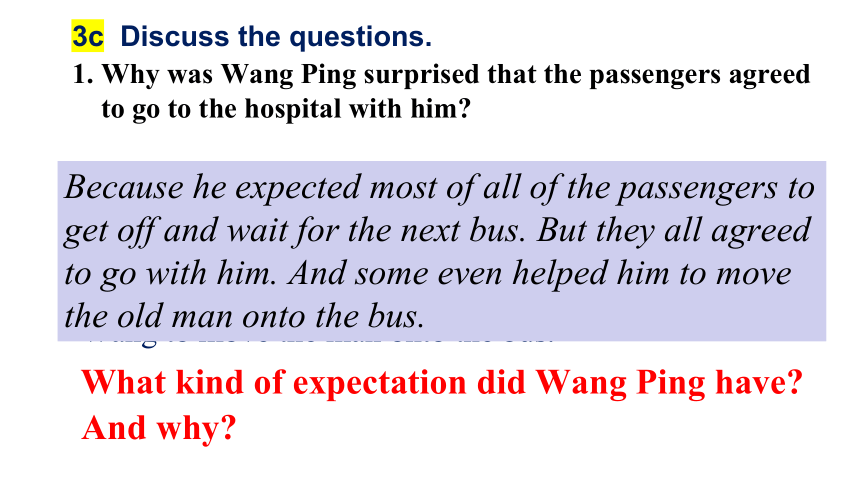
文档简介
(共20张PPT)
Unit 1 What’s the matter
Section A 3a-3c
the bus driver
a woman
an old man
get off the bus
shout for help
lie on the road
1. Who are they
2. What are they doing
3. Where are they?
4. What happened
Read the title and tell us what happened.
Answer questions according to the picture.
Skimming: Where does the passage come from
a story book
B. a science book
C. a newspaper D. a diary
It’s a piece of news.
When
Where
What
Who
kind of emergency(突发事件) does it talk about
did the emergency happen
did the emergency happen
was involved(涉及,牵涉) in the emergency
How
was the emergency handled(解决)
Bus Driver and Passengers Save an Old Man
Bus Driver and Passengers Save an Old Man
At 9:00 a.m. yesterday, bus No. 26 was going along Zhonghua Road when the driver saw an old man lying on the side of the road. A woman next to him was shouting for help.
bus driver, passengers, old man, woman
Task 1 Read the title and para. 1 to find information about the emergency.
When
Where
What
Who
How
Task 2 Read the last two paragraphs and find how the emergency was handled.
Read para. 2 and answer the questions.
1. What did the bus driver do
2. What did the passengers do
First, he stopped the bus without thinking twice.
Then, he got off and asked the woman what happened.
Finally, he told the passengers that he must take the man
to the hospital.
They agreed to go with the driver and some passengers helped Mr. Wang to move the old man onto the bus.
Read para. 3 and answer the questions.
1. How was the old man at last
2. How was the emergency handled(处理)
The man was saved by the doctors in time.
With the help of the driver, the woman and the passengers, the old man was sent to the hospital and saved by the doctors in time.
3b. Read the passage again and check ( ) the things that
happened in the story.
1.______Wang Ping was the driver of bus No. 26 at 9:00 a.m. yesterday.
2.______ Bus No. 26 hit an old man on Zhonghua Road.
3.______The old man had a heart problem and needed to go to the hospital right away.
4. ______The passengers on the bus did not want to go to the hospital, so only Wang Ping went with the woman and old man.
5. ______Some passengers helped to get the old man onto the bus.
6._____The old man got to the hospital in time.
√
√
√
√
3c Discuss the questions.
1. Why was Wang Ping surprised that the passengers agreed
to go to the hospital with him
…He told the passengers that he must take the man to the hospital. He expected most or all of the passengers to get off and wait for the next bus. But to his surprise, they all agreed to go with him. Some passengers helped Mr. Wang to move the man onto the bus.
What kind of expectation did Wang Ping have
And why
Because he expected most of all of the passengers to get off and wait for the next bus. But they all agreed to go with him. And some even helped him to move the old man onto the bus.
2. Did the passengers think Wang Ping did the right thing
How do you know
Thanks to Mr. Wang and the passengers, the man was saved by the doctors in time. “ It’s said that many people don’t want to help others because they don’t want any trouble,” says one passenger. “ But the driver didn’t think about himself. He only thought about saving a life.”
Yes. We can find the answer from one passenger’s comment(评论) on Wang Ping.
3. Do you agree that people often do not help others because
they do not want to get into trouble Why or why not
News 1
News 2
Bystander effect (旁观者效应):
It’s a phenomenon(现象). It means that during an emergency, a person would not offer(提供) help to the person who needs when there is someone else at the scene(在现场).
probability of offering help
the number of the people at the scene
Factors(因素) that cause bystander effect (旁观者效应):
1. 责任扩散:(不救助的罪恶感等扩散);
2. 社会影响结果(从众心理):无法评
估情境的紧急性;
3. 社会抑制作用:避免尴尬,互相观望;
Discussion
Humanity(人性)
Human weakness(人性的弱点)
We should try to overcome(战胜) it.
Try to help others while protecting yourself.
Language points
…bus No.26 was going along Zhonghua Road when the driver saw an old man lying on the side of the road.
1. “was going along” 过去进行时
2. “when the driver saw an old man lying on the side of the road” 是____________从句。
时间状语
3. see sb. do sth. 看见某人做某事
see sb. doing sth. 看见某人正在做某事
A woman next to him was shouting for help.
4. shout for help 大声呼救
5. shout to sb. (大声) shout at sb. (带有情绪)
The bus driver, 24-year-old Wang Ping, stopped the bus without thinking twice.
6. without doing 没有做某事
7. think twice 再三思考
e.g. Please think twice before spending all the money on clothes.
e.g. I will think twice about going anywhere.
He got off and asked the woman what happened.
8. 上\下(大型交通工具)get on/get off the bus/ train/ plane
上\下(小型交通工具)get into/get out of the car/ taxi
He told the passengers that he must take the man to the hospital.
9. take sb. to sp. 带领某人去某地
He expected most or all of the passengers to get off and wait for
the next bus.
10. expect sb. to do sth. 期待/预计某人做某事
11. wait for sb./sth.等待
But to his surprise, they all agreed to go with him.
12. to one’s surprise 让某人吃惊的是
to one’s + n.(情感类名词)
To my joy/ delight/ regret/ sorrow, …
Thanks to Mr. Wang and the passengers, the man was saved
by the doctors in time.
14. be saved by… 被…拯救
15. in time 及时;on time 准时
13. agree to do sth. 同意做某事
16. thanks to sb./sth. 幸亏,由于(在句子中作状语)
= because of = with the help of = with one’s help
e.g. Because of Mary, I finished homework on time.
= _______ ____ Mary, I finished homework on time.
= _____ ____ ____ ____ Mary, I finished homework on time.
= _____ ______ _____, I finished homework on time.
Thanks to
With the help of
With Mary’s help
thanks for (doing) sth. 感谢......(独立成句)
e.g. Thanks for helping me.
It’s sad that many people don’t want to help others because they don’t want any trouble.
v. trouble sb. 麻烦某人
e.g. Sorry to trouble you, but could you please tell me where this place is
17. trouble n. [U]问题,苦恼,麻烦
(be) in/out of trouble; get into/out of trouble
have trouble with sth.
e.g. He has trouble with his English.
have trouble (in) doing sth.
e.g. He has trouble (in) breathing.
The old man had a heart problem and needed to go to the hospital right away.
18. right away= at once = right now= immediately 立刻,马上
Bus No.26 hit an old man on Zhonghua Road.
19. hit-hit-hit 撞击
e.g. The ball hit the window.
get hit 受到撞击
e.g. Someone got hit by the football.
Unit 1 What’s the matter
Section A 3a-3c
the bus driver
a woman
an old man
get off the bus
shout for help
lie on the road
1. Who are they
2. What are they doing
3. Where are they?
4. What happened
Read the title and tell us what happened.
Answer questions according to the picture.
Skimming: Where does the passage come from
a story book
B. a science book
C. a newspaper D. a diary
It’s a piece of news.
When
Where
What
Who
kind of emergency(突发事件) does it talk about
did the emergency happen
did the emergency happen
was involved(涉及,牵涉) in the emergency
How
was the emergency handled(解决)
Bus Driver and Passengers Save an Old Man
Bus Driver and Passengers Save an Old Man
At 9:00 a.m. yesterday, bus No. 26 was going along Zhonghua Road when the driver saw an old man lying on the side of the road. A woman next to him was shouting for help.
bus driver, passengers, old man, woman
Task 1 Read the title and para. 1 to find information about the emergency.
When
Where
What
Who
How
Task 2 Read the last two paragraphs and find how the emergency was handled.
Read para. 2 and answer the questions.
1. What did the bus driver do
2. What did the passengers do
First, he stopped the bus without thinking twice.
Then, he got off and asked the woman what happened.
Finally, he told the passengers that he must take the man
to the hospital.
They agreed to go with the driver and some passengers helped Mr. Wang to move the old man onto the bus.
Read para. 3 and answer the questions.
1. How was the old man at last
2. How was the emergency handled(处理)
The man was saved by the doctors in time.
With the help of the driver, the woman and the passengers, the old man was sent to the hospital and saved by the doctors in time.
3b. Read the passage again and check ( ) the things that
happened in the story.
1.______Wang Ping was the driver of bus No. 26 at 9:00 a.m. yesterday.
2.______ Bus No. 26 hit an old man on Zhonghua Road.
3.______The old man had a heart problem and needed to go to the hospital right away.
4. ______The passengers on the bus did not want to go to the hospital, so only Wang Ping went with the woman and old man.
5. ______Some passengers helped to get the old man onto the bus.
6._____The old man got to the hospital in time.
√
√
√
√
3c Discuss the questions.
1. Why was Wang Ping surprised that the passengers agreed
to go to the hospital with him
…He told the passengers that he must take the man to the hospital. He expected most or all of the passengers to get off and wait for the next bus. But to his surprise, they all agreed to go with him. Some passengers helped Mr. Wang to move the man onto the bus.
What kind of expectation did Wang Ping have
And why
Because he expected most of all of the passengers to get off and wait for the next bus. But they all agreed to go with him. And some even helped him to move the old man onto the bus.
2. Did the passengers think Wang Ping did the right thing
How do you know
Thanks to Mr. Wang and the passengers, the man was saved by the doctors in time. “ It’s said that many people don’t want to help others because they don’t want any trouble,” says one passenger. “ But the driver didn’t think about himself. He only thought about saving a life.”
Yes. We can find the answer from one passenger’s comment(评论) on Wang Ping.
3. Do you agree that people often do not help others because
they do not want to get into trouble Why or why not
News 1
News 2
Bystander effect (旁观者效应):
It’s a phenomenon(现象). It means that during an emergency, a person would not offer(提供) help to the person who needs when there is someone else at the scene(在现场).
probability of offering help
the number of the people at the scene
Factors(因素) that cause bystander effect (旁观者效应):
1. 责任扩散:(不救助的罪恶感等扩散);
2. 社会影响结果(从众心理):无法评
估情境的紧急性;
3. 社会抑制作用:避免尴尬,互相观望;
Discussion
Humanity(人性)
Human weakness(人性的弱点)
We should try to overcome(战胜) it.
Try to help others while protecting yourself.
Language points
…bus No.26 was going along Zhonghua Road when the driver saw an old man lying on the side of the road.
1. “was going along” 过去进行时
2. “when the driver saw an old man lying on the side of the road” 是____________从句。
时间状语
3. see sb. do sth. 看见某人做某事
see sb. doing sth. 看见某人正在做某事
A woman next to him was shouting for help.
4. shout for help 大声呼救
5. shout to sb. (大声) shout at sb. (带有情绪)
The bus driver, 24-year-old Wang Ping, stopped the bus without thinking twice.
6. without doing 没有做某事
7. think twice 再三思考
e.g. Please think twice before spending all the money on clothes.
e.g. I will think twice about going anywhere.
He got off and asked the woman what happened.
8. 上\下(大型交通工具)get on/get off the bus/ train/ plane
上\下(小型交通工具)get into/get out of the car/ taxi
He told the passengers that he must take the man to the hospital.
9. take sb. to sp. 带领某人去某地
He expected most or all of the passengers to get off and wait for
the next bus.
10. expect sb. to do sth. 期待/预计某人做某事
11. wait for sb./sth.等待
But to his surprise, they all agreed to go with him.
12. to one’s surprise 让某人吃惊的是
to one’s + n.(情感类名词)
To my joy/ delight/ regret/ sorrow, …
Thanks to Mr. Wang and the passengers, the man was saved
by the doctors in time.
14. be saved by… 被…拯救
15. in time 及时;on time 准时
13. agree to do sth. 同意做某事
16. thanks to sb./sth. 幸亏,由于(在句子中作状语)
= because of = with the help of = with one’s help
e.g. Because of Mary, I finished homework on time.
= _______ ____ Mary, I finished homework on time.
= _____ ____ ____ ____ Mary, I finished homework on time.
= _____ ______ _____, I finished homework on time.
Thanks to
With the help of
With Mary’s help
thanks for (doing) sth. 感谢......(独立成句)
e.g. Thanks for helping me.
It’s sad that many people don’t want to help others because they don’t want any trouble.
v. trouble sb. 麻烦某人
e.g. Sorry to trouble you, but could you please tell me where this place is
17. trouble n. [U]问题,苦恼,麻烦
(be) in/out of trouble; get into/out of trouble
have trouble with sth.
e.g. He has trouble with his English.
have trouble (in) doing sth.
e.g. He has trouble (in) breathing.
The old man had a heart problem and needed to go to the hospital right away.
18. right away= at once = right now= immediately 立刻,马上
Bus No.26 hit an old man on Zhonghua Road.
19. hit-hit-hit 撞击
e.g. The ball hit the window.
get hit 受到撞击
e.g. Someone got hit by the football.
同课章节目录
- Unit 1 What's the matter?
- Section A
- Section B
- Unit 2 I'll help to clean up the city parks.
- Section A
- Section B
- Unit 3 Could you please clean your room?
- Section A
- Section B
- Unit 4 Why don't you talk to your parents?
- Section A
- Section B
- Unit 5 What were you doing when the rainstorm came
- Section A
- Section B
- Review of Units 1-5
- Unit 6 An old man tried to move the mountains.
- Section A
- Section B
- Unit 7 What's the highest mountain in the world?
- Section A
- Section B
- Unit 8 Have you read Treasure Island yet?
- Section A
- Section B
- Unit 9 Have you ever been to a museum?
- Section A
- Section B
- Unit 10 I've had this bike for three years.
- Section A
- Section B
